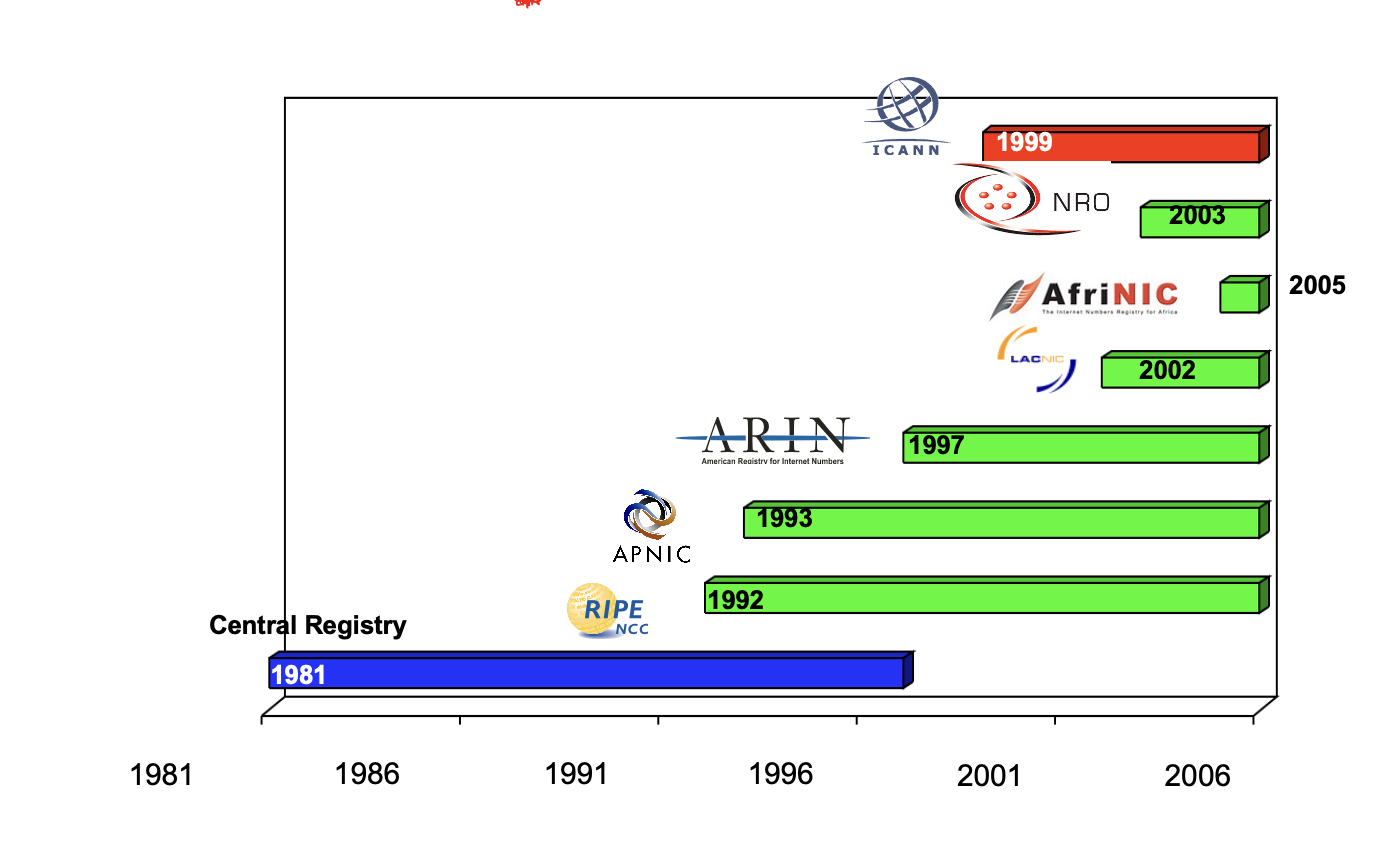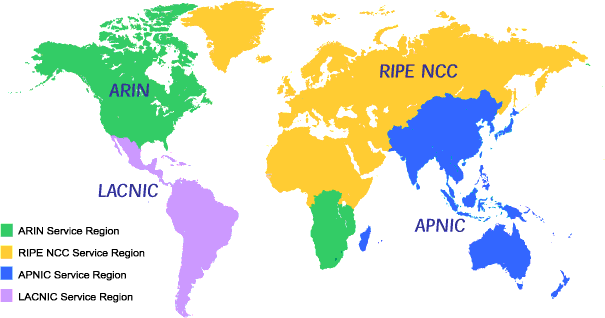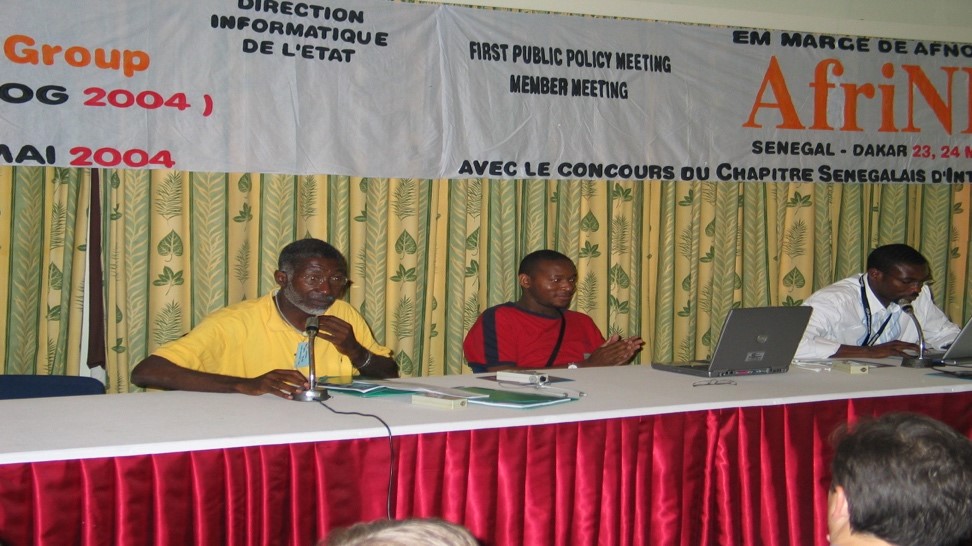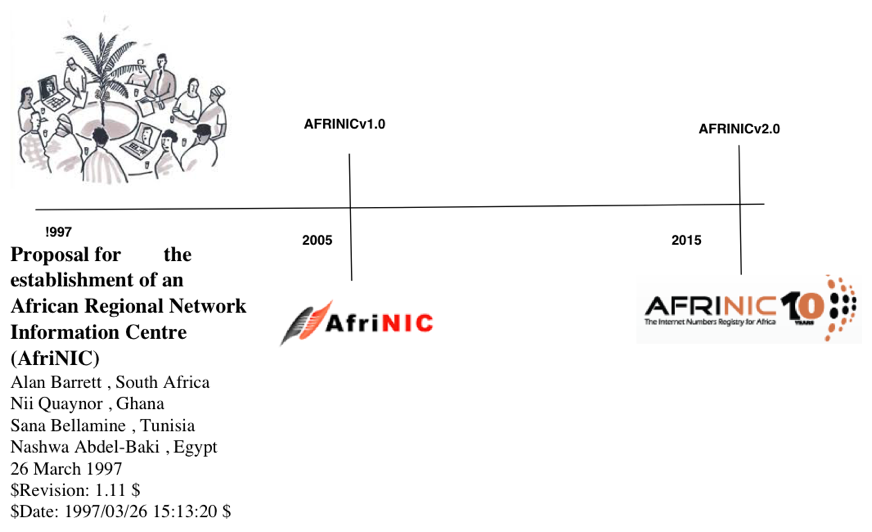AFRINIC’s Journey retold
By Adeola A. P. AINA
December 8, 2022
As AFRINIC continues its “walk” towards its 20th anniversary, recent events suggest how important it is to restate AFRINIC’s history – a journey that ought to be retold to help understand the current situation and hopefully help pave the way for possible solutions.
“If you close your eyes to facts, you will learn through accidents”. African proverb
Flashback a few decades ago, the Internet evolved from being a research and defense network into a commercial network connecting the masses around the world. People started enjoying the new Internet (email, WWW, etc.) and from there on, the Internet ecosystem evolved rapidly. The distribution of the number resources, also evolved from being managed by a central registry to what is known today as the RIR system.
As Africa was gradually accepting and adopting the Internet in the 90’s, the idea of localizing the distribution of number resources with the creation a Regional Internet Registry for Africa was embraced. Some non-African friends convinced the African pioneers that the registry must come together with the ongoing Internet adoption. A first initiative for an African RIR originated in 1997, at a time when RIPE NCC and APNIC were the only RIRs. A proposal was developed which suggested that AFRINIC was to be established as non-for-profit association in South Africa with operations in Accra (Ghana). The RIR shall be comprised of membership (ISP and non-ISPs), a Board of directors, an Advisory council (acting on behalf of the membership) with management staff, with registration services offered to ISPs and end-users.
It took almost a decade. The beginning of a long journey.

Fig1 Evolution of number resources management
1997-2005 A lot of groundwork needed to be accomplished to meet ICP-2 criteria , which included addressing misunderstandings and dissensions, building consensus, rallying supports, etc. A first regional meeting was held in Cotonou (Cotonou98) to bring everybody together and find a consensual approach. A rough consensus was reached in 2000 at AfNOG’s first meeting held in Cape Town in June 2000. Africa shall have its own Regional Internet Registry.
The list of founding members and initial supporters can be seen here . Some parts of the continent were more difficult to convince and bring onboard than others. Some were happy with services they were getting from RIPE NCC and ARIN and where not convinced of the need for Africa to have its own Regional Internet Registry.
An interim board was formed in 2001. At AFNOG 2003 meeting, following a long process of call for hosting and tedious discussions aiming to consolidate the consensus, it was finally decided, that AFRINIC will have Headquarter (Global coordination) in Mauritius, Technical Operations in South Africa, Backup and disaster recovery in Egypt (DR). Training centers were to be established in Ghana, Uganda, and Senegal.
The very first staff was hired in 2003. At this point, nothing could stop the system to move forward even though the consensus was still rough. Mauritius, South Africa and Egyptian governments honored their commitments for the establishment of the headquater, technical operations and the DR center.
In 2002 LACNIC got accredited and the RIR system had its fourth member. AFRINIC would become the fifth organization to join the RIR family.

Fig2: RIRs system before AFRINIC
AFRINIC held its first meeting during AFNOG 2004 in Dakar (Senegal) . First Board was elected, business plan and budget were approved. The consensus approach prevailed despite the dissenting opinions expressed about pricing, running costs, etc.

Fig3 AFRINIC1 meeting (May 2004)
AFRINIC got registered as a private company limited by guarantees of the registered members (the elected Board members). The Mauritius Companies Act limits members or shareholders of private company to a maximum of 25 members.
Application for recognition was submitted to the ICANN Board in August 2004 which gave a provisional recognition in September 2004. After the completion of the transition plan indicated in the initial submission, AFRINIC submitted an updated application for recognition as the fifth RIR. The ICANN’ 21 days public comment period did not attract many people, but majority of comments were positive, except one which could be found interesting . Final recognition was pronounced in April 2005.
The good news was announced live to the audience during AFRINIC2 meeting in Maputo.
Africa finally has its own Regional Internet Registry. The vision, mission and core values were as below:
Vision
Spearheading Internet technology and policy development in the African Region.
Mission
To serve the African community by providing professional and efficient management of Internet number resources, supporting Internet technology usage and development, and promoting Internet self-governance.
Core values
1. We operate with transparency, professionalism, and efficiency.
2. We are committed to integrity in all that we do always and everywhere.
3. We recognize and value individual contribution and teamwork.
4. We recognize cultural and language diversity in our region.
5. We are a technology driven organization that encourages continuous learning and innovation.
6. We value collaboration and cooperation with related organizations.
AFRINIC recorded what we call nowadays legacy resource holders (those with assignments prior to the RIR system) and those members of other RIRs whose resources were moved to AFRINIC.
2005-2015
The 1st decade was dedicated to consolidating AFRINIC structure, staffing and operations. The new RIR had to prove its relevance and serve its community formed from the initial rough consensus. Effort was carried out to consolidate that consensus, bring everybody onboard while honoring global commitments. Quickly, celebrations left ground to the realities.
AFRINIC Policy Development experience was kickstarted. Mailing list discussions and face to face public policy meetings with the usage of “rough consensus” were held, albeit not always easy. Discussions were held in English with translations in French during the face-to-face meetings. For many years, participation level was always below the expected level. Language, culture and the willingness to keep pace with long and sometimes difficult technical discussions were identified as the main barriers.
From the original plan, only the headquarter, the operations and the DR were implemented.
The governance had to evolve. Bylaws were amended in 2007 and 2012 to improve the governance and adapt to the evolving environment. In 2013, the Board of Directors took a resolution [201311.189] to review of the location and host of AFRINIC, but it did not get implemented. The expected public discussions and actions never took place.
In 2015, the 10th anniversary was celebrated. AFRINIC v2.0 started.

Fig4: AFRINIC 10th Anniversary: Courtesy to the African secret working group
The same year and in line with the IANA transition, the RIRs conducted accountabiliity review . Among others, AFRINIC was identified with some issues to fix. Discussions started and led to another bylaws review.
At the global, IANA IPv4 pool got exhausted with the distribution of the final 5/8 were to RIRs in February 2011. The management and distribution of the “last /8” followed some “soft landing proposals” adopted almost everywhere. The countdown for RIR’s IPv4 exhaustion started . Ideas for IPv4 transfers (Intra-RIR and Inter-RIR) were discussed. The 1st Inter-RIR transfer between ARIN and APNIC took place in October 2012.
As the IPv4 transfers took off, the ownership of the resources and the role of the RIRs got questioned. Number resources were not commodity and holders who no longer need them for their operations shall return them to parent registry.
Some concerns about AFRINIC resources been targeted by externals (offshore companies) after other RIRs run out of IPv4 were raised. Suggestions for AFRINIC to serve members of other regions at certain financial conditions, attempts to limit out-of-region usage of AFRINIC resources were made. Giving away the IPv4 addresses to Higher Education Institutions(HEI) based on number of students was also proposed. The details of these policy proposals and discussions are available at https://afrinic.net/policy/archive.
Among the various proposals those of particular interest are listed below:
https://afrinic.net/policy/archive/out-of-region-use-of-afrinic-internet-number-resources-d3
https://afrinic.net/policy/archive/limited-out-of-region-allocation-of-ipv4-resources-afpub-2011-v4-003-draft-02
https://www.afrinic.net/library/policies/archive/841-academic-ipv4-allocation-afpub-2013-gen-001-draft-01
None of these policy proposals succeeded as the community insisted that AFRINIC resources are meant to serve Internet development of the continent and they should be strictly be managed on a needs basis.
The community showed its first signs of division. The idea of AFRINIC and its members making money from IPv4 addresses persisted.
IPv4 became a contentious topic. Tension rose around evaluation of some requests for allocation. Board got involved in allocations and registration services affairs. The “allocate and revoke later if evidence” approach taken seems to have undermined the effort and risks associated with such revocation. The sequel proved the critics right.
2015-now
Ending 2014 and beginning 2015, founding CEO resigned and left. A new CEO was recruited. It turned to be one of the co-authors of 1997’s proposal. Three years later, a new CEO took the commands as the previous also resigned.
Suspicions of sexual harassments on staff splashed board members. It was dealt not without difficulties.
AFRINIC still holds IPv4 in its free pool. It went through the 1st phase of the soft-landing policy where members can still get up to /13 IPv4 to the second phase with a maximum of allocation/assignment size of /22 without limitation.
AFRINIC community adopted an Intra-RIR transfer policy. Legacy and non-legacy resources can be transferred among AFRINIC members on need justification evaluated by AFRINIC.
Pressure kept mounting for the AFRINIC community to adopt an Inter-RIR IPv4 transfer policy which is symmetric and reciprocal to other regions’ Inter-RIR policies.
A customized Inter-RIR transfer policy proposal reached consensus pending ratification by the board. It allows resources transfers among AFRINIC members, resources to be transferred into the region, but only allows legacy and resources which moved into the region to be transferred out . Only ARIN stated that this proposal is unacceptable for the region.
The Policy Development Process went through several weaves of uncertainties. The process was overwhelmed with proposals which rendered the process inefficient, and productivity was at its lowest.
Policy proposals such as “review of number resources usage by members”, “abuse contact update”, “Policy Compliance Dashboard” or “RPKI ROAs for Unallocated and Unassigned AFRINIC Address Space”, which were meant to strengthen the registry function and reduce abuses were opposed and or appealed. For the 1st time in AFRINIC’s history, co-chairs were recalled.
Resource misappropriation by staff and members were uncovered. Disciplinary and legal action were taken and resulted in the ongoing legal dispute saga . AFRINIC, the private company was sued with numerous cases which inevitabily disruptedi the registry. Arbitration was not considered in first instances.
While the substantial cases are still waiting to be heard, the registry seems frozen even though the technical operations are under control and performing satisfactorily.
In conclusion
Continent-wise, the start looks modest, but the journey was quite enigmatic. Unfortunately, the initial rough consensus did not consolidate over time. Divergence and division occurred. On several occasions, the system wobbled, but did not sink.
The fundamentals i.e., bottom-up processes, community-driven and rough consensus were all challenged. Democracy and voting were brandished forcefully. Cochairs appointment and board members’ election became conflictual.
Probably being the last RIR to come into play did not help as the pressure was too much on the newcomer who must have missed some important bends.
Certainly, errors were made along the way, but unless we decide to prove right the initial skeptics, we shall fix it. Urgent solutions must be found to refloat the boat again and allow community and larger membership to face and address the problems.
I hope this story retold will help with addressing the current problems. The world expects a better AFRINIC, probably AFRINIC 3.0.
As I write, AFRINIC manages 7.23 /8 (2.82% of the total IPv4 space), counts around 2,109 members, 4M total reserved, 1M total policy reserved and 1.5M total available IPv4 with 51,60% of members with both IPv4 and IPv6. Africa shows 1.55% of” IPv6 capable” and 1.50% of “IPv6 preferred” according to APNIC labs.
It is all about responsible and fair management of Internet number resources for AFRICA.